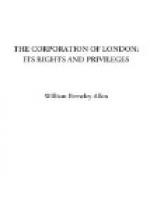former capacity it enacts by-laws for the better government
of the Corporation, in conformity with immemorial
usage confirmed by 15 Edward III., and again more recently
and fully by the Municipal Corporations Act.
The charter of Edward III. authorizes the mayor and
aldermen, with the assent of the commonalty, “where
any customs theretofore used and obtained proved hard
or defective, or any matters newly arising within
the City needed amendment, and no remedy had been
previously provided, to apply and ordain a convenient
remedy, as often as it should seem expedient; so that
the same were agreeable to good faith and reason, for
the common advantage of the citizens, and other liege
subjects sojourning with them, and useful to king
and people.” Vested with such powers as
these, the Corporation of London are clearly competent
to introduce whatever reforms circumstances may render
desirable. As practical men of business, the
Court of Common Council may fairly be supposed to be
the best judges as to the nature of the amendments
to be made, and the right time of making them.
Persons engaged in commercial pursuits are not usually
obstructive, or opposed to useful innovations.
On the contrary, being wedded to no theories, they
are constantly impelled to change, and to act upon
each emergency as it arises. The past history
of the City of London is one long illustration of this
position,—it is an uninterrupted series
of reforms, many of them rather beneficial to the
nation at large than to the Corporation itself.
On what grounds, then, is it justifiable to supersede
this salutary internal action of the Corporation,
and to exercise the arbitrary power of the legislature
to enforce crude and inapplicable innovations?
This interference with the self-government of the City
is, in fact, a vote of censure on the duly elected
representatives of the citizens, with whom the majority
of the citizens themselves are, however, perfectly
satisfied. But, in truth, that “self-government”
is the head and front of their offence, for is it
not a stumbling-block to ministerial and oligarchical
influence? In addition to the power of enacting
by-laws, the Common Council superintend the disposal
of the funds of the Corporation; and without their
previous consent no larger sum than 100 pounds can
be paid for any purpose whatsoever. Their executive
functions are also considerable. Upon this court
depends the responsibility of electing the common serjeant,
the town clerk, the two judges, and officers of the
Sheriffs’ Court, the clerk of the peace, the
coroner, the remembrancer, the commissioner of the
city police, and various other officers of inferior
note and standing.
The Citizens.




